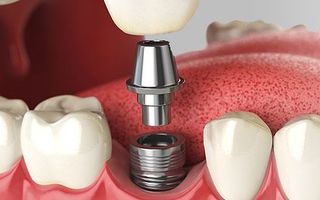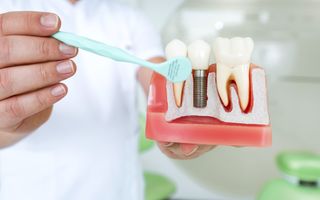
Dental Implants
The best treatment for replacing a single or multiple teeth
The best treatment for replacing a single or multiple teeth
A permanent solution for missing teeth, dental implants can restore your smile, and improve your oral health.
Here’s all you need to know about our high-quality dental implant service at Strathfieldsaye Dental Practice and why they might be the right choice for you.
What are dental implants?
Dental implants are artificial tooth roots that are surgically placed into the jawbone.

Once the implant integrates with the bone, it provides a sturdy foundation for a replacement tooth, bridge, or denture.
The visible part of the implant, known as the crown, is custom-made to match your natural teeth, ensuring a seamless and natural-looking smile.
Dental implants usually have three distinct parts:
- Implant: An artificial device that serves as a type of root for artificial teeth.
- Abutment: A permanent metal post that holds a tooth or set of teeth in place.
- Crown: The part of the tooth that's visible whenever you open your mouth or smile.
What are the benefits of dental implants?
Dental implants offer a wide range of advantages over other tooth replacement options, including:
- Natural appearance: Dental implants look and feel like your natural teeth. The crown is custom-made to blend seamlessly with your existing teeth.
- Improved comfort: Unlike dentures, which can slip and cause discomfort, implants are securely anchored in your jawbone, providing a stable and comfortable fit.
- Better oral function: Implants let you chew with ease, allowing you to eat your favourite foods without restriction.
- Bone preservation: Dental implants help prevent bone loss in the jaw, which can occur when teeth are missing. This helps maintain the structure of your face and prevents a sunken appearance.
- Durability: With proper care, dental implants can last a lifetime, making them a cost-effective long-term solution.
- Improved oral health: Unlike dental bridges, implants don’t require the adjacent teeth to be altered, so your natural tooth structure is preserved.
Why is a dental implant a good choice?
If you permanently lose a tooth, it can cause further deterioration of your oral health. For example, tooth loss leads to loss of bone in the jaw, which may cause the face to look sunken. Additionally, getting a dental implant replacement will help you to continue eating as normal, and it will fill any gaps in your smile.
This is why it’s a good idea to have a dental implant.
Other options include dentures and bridges. However, traditional dentures and bridges fit over the gums and jawbone but do not attach to it. Because dental implants are surrounded by the natural jawbone and gum tissue, they're often preferred over dentures and tooth-supported bridges since they stimulate new bone growth. This is especially the case when your teeth are weak, or when previous disease to the ligaments and jawbone has occurred.
We understand the importance of a healthy smile and the impact it can have on your overall well-being. Dental implants provide a permanent and natural-looking solution for missing teeth, restoring your oral function.
What is the process for getting dental implants?
It’s important to be aware that the process of getting dental implants typically involves several steps and can take a few months to complete. Here’s what you can expect:

1. Initial consultation
During your first visit to Strathfieldsaye Dental Practice, we’ll evaluate your oral health, take X-rays, and discuss your treatment options. If dental implants are suitable for you, we will develop a personalised treatment plan.

2. Implant placement
The next step involves surgically placing the implant into the jawbone. This procedure is usually done under local anaesthesia. After placement, the implant will need time to integrate with the bone, a process called osseointegration, which can take several weeks to a few months.

3. Abutment Placement
Once the implant has fully integrated, a small connector called an abutment is attached to the implant. This will hold the replacement tooth or crown securely in place.

4. Crown Placement
The final step is to attach the custom-made crown to the abutment. The crown is designed to match the shape, size, and colour of your natural teeth, giving a seamless appearance.

5. Follow-up Care
After the implant is in place, we’ll schedule follow-up visits to ensure everything is healing properly and the implant is functioning as it should.
Results may vary in individual cases. The photo(s) used are stock photos of people who are not patients of National Dental Care, employees or affiliates.
Why choose National Dental Care Strathfieldsaye for dental implants?
At Strathfieldsaye, we’re committed to providing exceptional dental care tailored to your individual needs.
Make an appointment today
If you’re considering dental implants, our qualified team is here to help you achieve a healthy, beautiful smile.
Contact us today to schedule your consultation and take the first step towards restoring your smile with dental implants.
Here are some reasons to choose us for your dental implants
A friendly and experienced team: Our team of highly qualified dentists and support staff has extensive experience in providing quality dental care to the local community.
State-of-the-art facility: We use the latest technology and equipment to ensure you receive the best possible care.
Patient-centred approach: We focus on providing personalised care tailored to your individual needs, taking the time to listen to your concerns and answer your questions.
Comfortable environment: We understand that dental visits can be stressful. We’re here to make your experience as relaxing as possible within our welcoming practice.
Preventive approach: We focus on preventive care to help you maintain optimal oral health and avoid more serious dental issues in the future.
Affordable services: We want to make high-quality dental care accessible to everyone. Ask us about our convenient payment plans and health insurance partnerships.
Frequently Asked Questions
Dental implants are a great option for people who have lost one or more teeth due to injury, decay, or gum disease. They are suitable for those who:
- Have one or more missing teeth
- Have sufficient jawbone density to support an implant
- Are in good overall health
- Do not smoke, or are willing to quit, as smoking can affect the healing process
- Are looking for a long-term solution to tooth loss
If you are unsure whether dental implants are right for you, our team at Strathfieldsaye Dental Practice can assess your situation and help you make an informed decision.
While dental implants are an excellent solution for many people, they are not suitable for everyone. Certain factors may affect your eligibility for implants, including:
- Insufficient bone density: If you don’t have enough bone in your jaw to support an implant, you may require a bone graft or alternative treatments.
- Health conditions: Certain medical conditions, such as uncontrolled diabetes or autoimmune diseases, can affect healing and implant success.
- Smoking: Smoking can interfere with the healing process and increase the risk of implant failure. It is important to quit smoking before undergoing implant treatment.
- Age: Young people whose jawbones are still developing may not be suitable candidates for implants.
Our team at Strathfieldsaye Dental Practice will conduct a thorough assessment to determine if dental implants are right for you. If implants aren’t suitable, don’t worry - we’ll work with you to find the best treatment option to restore your smile.
During the procedure, you shouldn’t feel any pain as your dentist or oral surgeon will apply anaesthetic. In the days following each procedure you may feel some tenderness or pain, which can be managed with over-the-counter pain medication.
As with natural teeth, it's important to properly care for your dental implants to avoid issues. That means thoroughly brushing your teeth and rinsing out your mouth to remove debris and plaque. You'll also want to continue getting regular dental check-ups. If you neglect your dental hygiene after you've received dental implants, plaque and gum infections can occur because they're bonded with the jawbone and gum tissues.
Your dentist will advise you on whether or not you are a good candidate for dental implants.
Generally speaking, children and teens are too young for implants as their bones are still developing, smokers are advised to quit if they want an implant because the habit can cause bad outcomes with the healing process, and those who don’t take good care of their teeth may also not be good candidates as you will need to look after your oral health for the implant to work.
Additionally, those in advanced age may not be advised to have implants, as they may not heal as well as required.
Dental implants are made to last, so technically speaking, they should last a lifetime. Regular check ups and proper care will ensure their longevity. If anything, you may need a new crown after 10-15 years if your existing one begins to wear down or crack.


